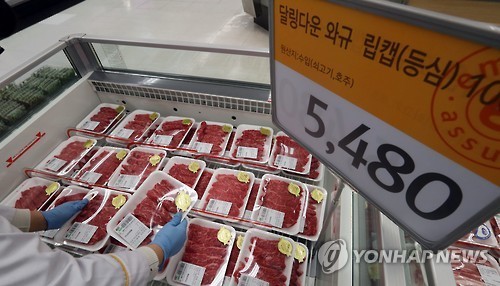The South Korean government is set to look into a widening price gap between the wholesale and retail prices of local beef, officials said Thursday, as it is feared to further hurt the industry and consumer spending already daunted by the new anti-graft law.
The producer price of Korean beef, known as hanwoo, stood at 45,252 won ($39.80) per kilogram as of Tuesday, down 26.7 percent from four months earlier, according to the government's livestock data.
 |
An employee is stacking packs of Australian beef in the fridge at a local supermarket chain store in Seoul on Feb. 2, 2017. South Korean consumers are shunning local beef over its oddly high price while its wholesale value has taken a downturn. (Yonhap) |
Such a drop, however, has barely affected its price at supermarkets, as the retail price managed to slide 1.6 percent to 78,697 won in the same period.
"We plan to find out reasons why the consumer price isn't coming down as opposed to how its wholesale value's been falling since the anti-graft law came into effect," an official at the Ministry of Agriculture, Food and Rural Affairs said.
The new anti-corruption law, in effect from September last year, is being blamed by the local livestock industry for hindering their business as it has put a legal limit on money people in certain professions can spend on gifts and free meals for hospitality purposes.
Hanwoo, for its high quality and price, is considered a very expensive gift and served as a main dish on special occasions.
The government said it will check whether there are any discrepancies in the distribution process and possible profiteering by distributors.
The outbreak of foot-and-mouth disease in provincial areas early last week has also been adding woes to the local beef industry, pushing down its wholesale prices. (Yonhap)




![[Herald Interview] 'Trump will use tariffs as first line of defense for American manufacturing'](http://res.heraldm.com/phpwas/restmb_idxmake.php?idx=644&simg=/content/image/2024/11/26/20241126050017_0.jpg)

![[Health and care] Getting cancer young: Why cancer isn’t just an older person’s battle](http://res.heraldm.com/phpwas/restmb_idxmake.php?idx=644&simg=/content/image/2024/11/26/20241126050043_0.jpg)

